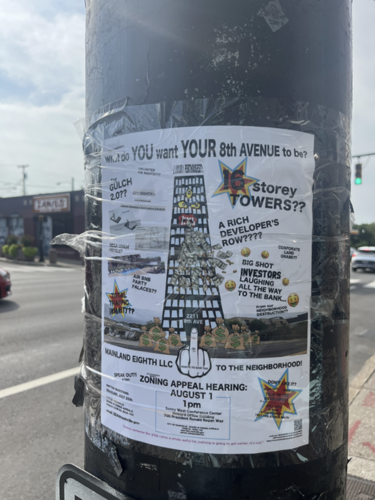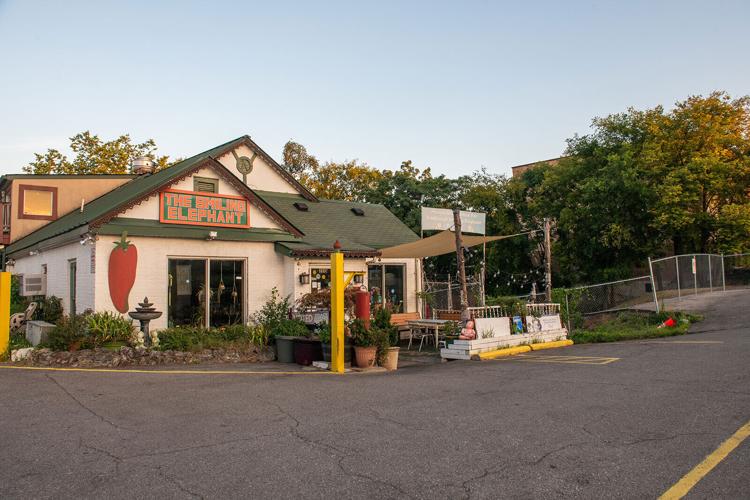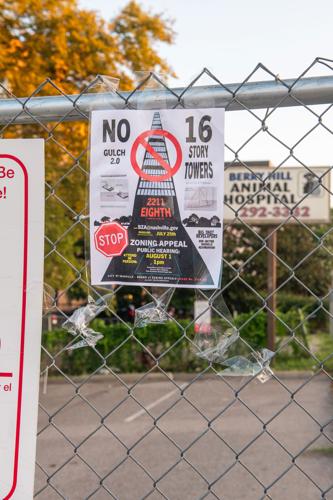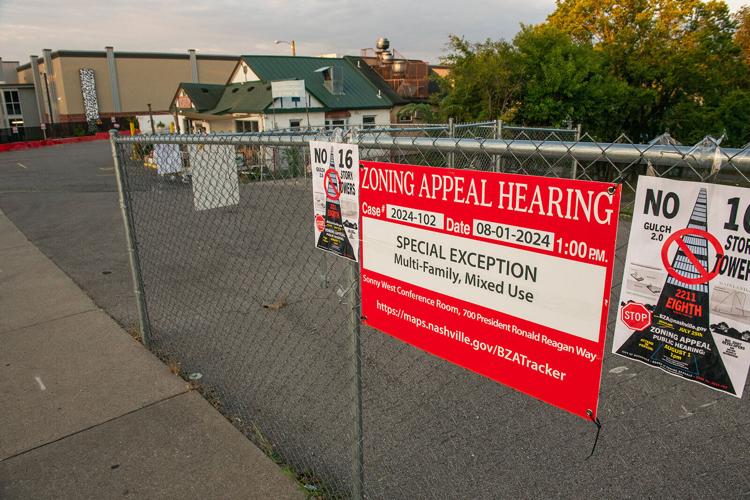
A sun-bleached sign for Berry Hill Animal Hospital is the only thing left between 2209 and 2211 Eighth Ave., a small commercial strip that’s facing big changes. The vet’s office is still in business — it moved across the street a few years ago after Mainland Companies, a real estate firm in Hillsboro Village, scooped up both properties for $3 million.

A flyer posted on a telephone pole near the site of a potential Eighth Avenue development
“It’s been empty, what, almost two years now?" says Kao Phosorath, manager at The Smiling Elephant, who looks to another employee for confirmation during a Thursday lunch rush. "Until that flyer came, we hadn’t heard anything. I know something’s going to come — it is their property — I just hope it’s not way, way too tall and that the construction does not do damage to us. Our owners here, they will never sell, and they get lots of offers. We are not going anywhere.”
Kao remembers the construction headache, blasting and debris when the Publix was built on the other side of The Smiling Elephant, a popular Thai restaurant known for its green bean noodles and various stir-fry offerings. A printed flyer showed up at the restaurant in mid-July. The same posters appeared down Eighth Avenue, plastered with indignant phrases framing a money-spewing skyscraper with three eyes. Interested neighbors are called to the zoning appeal hearing at 1 p.m. on Aug. 1 to “speak out” against “Gulch 2.0” and “big shot investors laughing all the way to the bank.”

First-term district Councilmember Terry Vo, whose support could pave the way for the project, must balance its potential with blowback from nearby neighbors, many of whom describe the area’s peace, quiet and historic character as assets on the auction block. Vo tells the Scene she is still collecting information about the project and has not decided whether to officially support a rezoning.
Mainland Companies CEO Ken Larish wants residents to see the future with him.

“I think it's going to have a real sense of place, and I feel like we can really do a great job on the pedestrian, retail and knitting the street together and making it walkable,” said Larish at a recent community meeting in the basement of The Cookery. “It may lead to more modern and higher-end developments.”
Larish spoke mainly to a few concerned attendees in the front row. For more than two hours, he answered questions from the room. Behind him, Larish had land-use attorney and former Metro zoning administrator Jon Michael, who will help Mainland Companies argue for a zoning change approving a 16-story tower at the site. Late in the meeting, Michael laid out the legal reality of the upcoming BZA hearing. At times, he quoted Metro code from memory.
“We have objective conditions that we check, and we do that with the plans, the math, the arithmetic, and the renderings — we do what is required of us,” said Michael during a tense exchange with one neighbor. “If I like it, if I don’t like it, that doesn’t matter. It just matters if we can meet their criteria. Our feelings really don't matter. That's a harsh thing to say, but it's accurate. If I'm an opponent, I try to argue that I don't think they meet these criteria or one of the conditions. This is effectively me giving you legal advice on how to oppose the project that I'm supporting.”
The city has an affordable housing crisis, but developments that attempt to ease the strain frequently face opposition from neighborhood advocates
Posters behind Michael and Larish showed a bustling street-side patio with street-level retail shops. Above, Mainland promises 15 floors of condos flooded with natural light. For proponents, an overcrowded bike rack symbolizes new residents eager to walk, bike or use public transportation along a priority transit corridor. For opponents, the bike rack conceals a coming parking crisis. The next easel props up the rezoning sought by Mainland, visualized in two dimensions. Mainland’s proposed building, which Larish praises as “slender,” breaks the dimensional envelope allowed by property right, which evenly scales height and width like a pyramid.
“If we lose at the BZA, we would pursue the development of the building as a matter of right,” said Larish. “And that would be a shame, because it would be a worse building.”
Skepticism softened a bit with an impassioned speech from attorney David Mangum, who shared his own experience dabbling in local real estate.
“You're exactly right — life is full of risk,” Mangum said, turning to speak to the room’s most vocal detractors. Mangum shared memories of working in the neighborhood in the time of “massage parlors,” a reference to Eighth Avenue’s grittier past. “But you’re going to have that, or you’re going have a guy come to town from Atlanta and build a stucco box, fill it up, and sell it.”
Outside the meeting, Eric Steele spoke with the Scene about the ongoing effort from neighbors to jointly express dissatisfaction with the proposal, which he calls a “middle finger” to the neighborhood. Beyond parking fears, Steele worries the building will bring tourist chaos and increase incidents of public intoxication through the surrounding neighborhoods, where he grew up and lives now.
“I’ve got a pretty good background in real estate, and now this is personal,” Steele, an associate director in commercial real estate, tells the Scene. He likens it to a similar skyscraper that drew neighborhood pushback in Williamsburg, Brooklyn, where Steele lived before moving back to Nashville. “Regardless of how well they do it, someone else is coming in right after them. I told my friend before the meeting, 'We don't need to share too much, let's save it for the zoning hearing.' I don't think the process really is set up to get that kind of community input anyway.”









